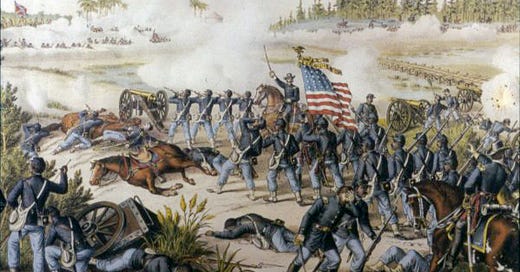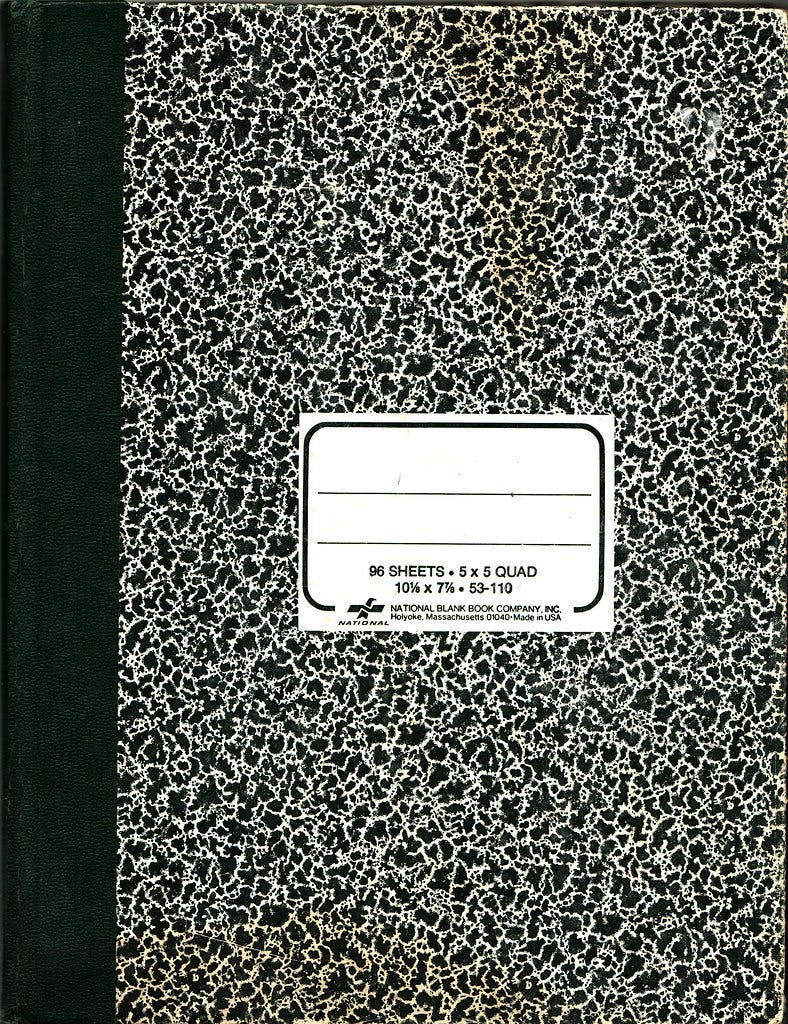Hi everyone!
This week, I’m looking at a few foundational moments of creativity from my childhood…or am I?
Periods After Every Word
I learned to read and write quite early, to the point that I don’t remember my father ever reading to me. I once accused him of never doing so, but he corrected the record: I simply caught on so early that I can’t remember our story times.
When we lived in Buffalo, New York — specifically, the neighborhood of Tonawanda — I would write stories in those traditional composition notebooks. You know the ones:
(credit: Calsidyrose)
My memories of these stories are pretty hilarious. Micro-fiction, essentially: short on plot, short on character. The majority were about a princess who had a horse and how they lived happily every after.
Here’s my attempt at reconstructing these early masterpieces:
A. princess. had. a. horse. She. was. happy. She. loved. the. horse. They. were. happy. The. end.
There were illustrations as well. Nothing I could find on Google quite captured how blocky they were.
I’m sure you noticed the periods. Well, I was convinced that you needed a period not just at the end of every sentence but after every word. So convinced was I that I remember arguing fervently with my mother about this point of grammar.
To paraphrase the Anthony Trollope novel I’ve never read: I KNEW I WAS RIGHT.
This heady, childish bravado is what I’m talking about in the title of this post. Not once did it occur to my (admittedly not-very-developed) three or four year-old brain that my far older mother whose medical books I thumbed through and drew in the margins of might actually have the lived experience and knowledge to know better.
The argument concluded when Mom opened one of her medical books to show me the proper use of punctuation. I recall staring at the page but nothing beyond that. It’s almost like the trauma of being wrong has wiped it from my brain. (More likely, my memory is probably just patchy in those moment because, you know, I was about three.)
I treasured those composition books with my flat fantasy flash-fiction until we lost them during our move from Phoenix to Jacksonville when I was six-going-on-seven. The loss of those books is one of the reasons that both my mother and I are afraid of throwing anything to do with my writing. Even now, I have undergraduate notebooks buried in our “workshop” (aka junk room).
The sad reality is that I’m never going to recover those notebooks, no matter how much else I preserve. And the sooner I get rid of that stuff, the freer I’ll feel.
But there’s another reality worth considering here: that everything I just told you isn’t actually true.
The Brick Behind the Falls
One time in undergrad, I was speaking to my dad on our mutual landlines, and the past came up as it often did.
Living in Tonawanda, we frequently visited Niagara Falls. I have a whole series of memories of going to a specific shopping center and getting a massive slice of pepperoni pizza, grease pooling in the center of the meat slices. The shopping center even had an indoor atrium with plant and water features that I loved walking through — the little water fall was my favorite.
In the middle of my reminiscing, I mentioned that time when the falls had frozen, and you could see through the glassy wall of ice to the tan brick with portholes behind the falls.
“What are you talking about?” my dad said. “There’s no brick behind the falls.”
Replay the conversation with my mother about twenty years before. Except now I had the internet to back me up….
Except Dad was right, and I was wrong. Niagara Falls are natural falls, and the idea that tan brick with portholes lies behind them instead of rock is essentially as factual as the Earth being flat.
But my memory was so strong. And I was so sure. Until reality proved me wrong.
While we used to believe in our memories as faithful recorders of events, we now know that false memories are everywhere. Beyond individual, relatively harmless ones like my Niagara brick wall, there are examples of mass mis-remembering now called the Mandela effect (based on the erroneous belief that Nelson Mandela died in prison in the 1980s). A recent example is the mass belief in a non-existent movie called Shazaam starring Sinbad in the 1990s.
The power of suggestion plays a huge role in the formation of false memories, as we saw during the false child-abuse scandals that arose during the “Satanic Panic” of the 1980s. Professionals and parents who did not understand how to interview children did so in a way that encouraged them to recount detailed — false — examples of satanic abuse at places like McMartin preschool in California.
My favorite TV show of all time, the OG Unsolved Mysteries, had an ongoing series of stories about reincarnation that I once believed but now consider false memories planted (intentionally? hard to say) by hypnotists. They remain some of my favorite segments from the show, but for the production values, not their veracity.
At worst, false memories can condemn innocent people and divert attention away from the real perpetrators. So much focus was placed on Satanism in preschools, for instance, that no one considered that older institutions like the Catholic Church might have been perpetrating far worse, and far more widespread, abuse.
On the whole, my Niagara revisionist history doesn’t mean much of anything. It does, however, remind us that even autobiographies and memoirs are not the factual recollections we tend to believe they are. I don’t see that as a bad thing, except when we demand a level of truth from these works that they cannot provide.
It’s one thing to make up an entire life story in order to make money, such as the old JT LeRoy scandal. It’s another to pull an Oprah and castigate James Frey on live television for making up parts of his memoir. I’m not defending Frey here — I’ve never read his work, so I can’t say for sure what I think of how he manipulated facts (that could be fact-checked).
But I think Oprah demanding “truth” is just impossible. It’s why I feel like the instruction to U.S. jurors to be “fair and impartial” (my emphasis) is impossible. Humans are, by nature, incapable of being impartial. Just as we are, by nature, incapable of being accurate repositories of memory. And even when we have supposedly impartial records like video or audio recordings, our interpretation of those materials is never free of bias.
Creativity Stifled?
There’s one other memory I want to share, this time from fourth grade. That year was the state history year, and the unit’s major assignment was to write two separate book reports about a historical figure and an historical event. We had a list to choose from, and to make it fair, we would draw numbers to determine the order in which we would pick.
In the only example of a lucky streak I’ve ever had, I drew #1 both times. For the figure, I chose railroad baron Henry Flagler. I don’t even remember why. He turned out to be rather boring. But for the event, the choice was clear and easy. I was obsessed with the American Civil War, and only one battle took place in Florida: the Battle of Olustee. So, that was my choice.
When it came to daily homework, I was diligent and didn’t procrastinate. But my (potentially faulty!) memory is that I put this project off until the last minute — maybe even the night before.
For one of the few times in my life, I turned to a parent — my dad — for help with my homework. As I recall, I showed him my initial handwritten efforts. What I wanted to do was structure my report as a recollection. I was imagining something like a rugged group of battle-scarred old men sitting around a table in a tavern, smoking and talking about that fierce day of war.
Then, cut to the flashback, and a first-person recollection of the battle.
(The 1894 Kurz and Allison lithograph of the battle, purportedly showing the advance of the 54th Massachusetts regiment that included African-American soldiers; these lithographs were wildly inaccurate but very popular. Credit: FL state archives)
When I explained this to my dad, though, he nixed it immediately. Pulling out the typewriter, he helped me with a far more standard, by-the-numbers book report. The Battle of Olustee took place on February 20, 1864. Approximately 5,500 men on each side fought under Brigadier General Joseph Finegan on the Confederate side and Brigadier General Truman Seymour of the Union Army. Nearly 2800 casualties were reported. See Spot. See Spot Fight.
I look back on this memory and see an assignment salvaged but a creativity stifled. The unintentional message planted in my brain was that creativity was bad, especially if I wanted the good grades that I was pressured to make. Thinking too far outside the box was not useful and therefore not allowed.
And for decades after, I told myself that I wasn’t creative. I was a literary scholar because I could only analyze the works, not make them myself.
It’s a potent story — IF it’s true. I think at least some of it is. And on its own, it’s a sad one.
But it doesn’t have to stay that way. I have the power to rewrite that memory. What a lovely, clever little idea I had! I sometimes fantasize about writing it just for my own pleasure, though there’s admittedly a lot of well-deserved baggage taking on any Civil War battle these days. (Though I’m learning now that three U.S. Colored Troops units took part in the battle, a part of history that deserves more attention.)
All of this is to say, that it’s worth questioning your memories, especially the ones that hold you back. They may not be true. And even if they are, there’s room for revision, for expansion that allows other possibilities. Maybe one day I’ll write a short story about Olustee veterans. Maybe one day I’ll write a sci-fi novel in which all Niagara’s supposedly natural features are actually steampunk clockwork style automatons.
Or maybe I’ll just always keep in mind that memories are stories, malleable sheets of gold that shape shift with every retelling.
Do you have false memories you’ve discovered?
Recommendations
Retro Report. This series of videos, like the one above on the McMartin preschool scandal, re-examine major news stories of the past, from the damage done by thalidomide to the “Baby M” surrogacy trial. I only knew about the ones done in collaboration with The New York Times in the early 2010s, but you can find far more of them on the Retro Report YouTube channel.
My first (online) piece for National Geographic! Excited to have this byline, but especially excited to have the opportunity to tell this truly meaningful story. When I referred to being on reporting trips, this was the story I was doing. (FYI: You have to give your email to access the article, but it’s not behind a paywall.)
This Week’s Dose of K-Pop: ITZY, “Cheshire”
I think this is one of ITZY’s best songs, but I chose it given the overall theme of “Real or Fake?” going on in the video and the song, which advises a love interest to just take things easy and not overanalyze. “Why so serious?” it asks. Why, indeed?
Enjoy!
Love y’all,
Sara






My earliest memory is of my dog pulling down my diaper to enjoy a tasty treat, but I'm certain that's been reconstructed in my visual memory by looking at photos of me as a toddler and hearing the story again and again from my family. Less interesting than a steampunk Niagara Falls for sure!!